
Johnny Cash
country
Support www.hipchristmas.com! Shop at Amazon, Apple Music, and more...
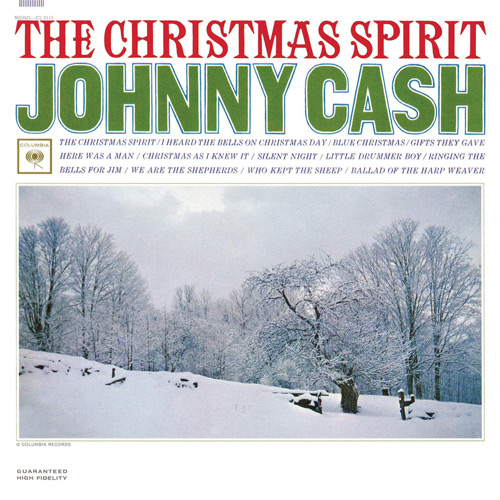 Why
do Christmas albums suck? As I own a few thousand of the silly things, it's a question
I often ponder. If I had a nickel for every time I ruefully sighed, "Gee, I
love this guy, but this record blows!" I'd have well over 100 bucks (do the math).
The simple fact is, artists of great talent and character often record bland, nondescript
Christmas albums of little worth. The reasons for this phenomenon, however, are more
complex.
Why
do Christmas albums suck? As I own a few thousand of the silly things, it's a question
I often ponder. If I had a nickel for every time I ruefully sighed, "Gee, I
love this guy, but this record blows!" I'd have well over 100 bucks (do the math).
The simple fact is, artists of great talent and character often record bland, nondescript
Christmas albums of little worth. The reasons for this phenomenon, however, are more
complex.
One potential factor is simple: the artists in question are past their prime. Fats Domino, for instance, didn't cut his holiday platter till nearly 40 years after the hits stopped coming, and the results were predictable. Ol' Fats sounded old indeed, and at times you'll swear you can hear him snoring in the background. These days, Christmas albums are generally considered an act of desperation, a brazen ploy to recapture an audience by pandering to the mainstream.
Perhaps they are. Why else would 70's icons like Chicago, America, Jethro Tull, and the Moody Blues suddenly get the Christmas spirit near the turn of the century? Sometimes it seems like every living classic rocker who hadn't already cut a Christmas album (and that means most of them) did exactly that between 1990 and 2000 - with predictably lackluster results. Christmas albums may be intended to revive flagging careers, but the reality is often the reverse - Christmas albums are harbingers of doom: impending death, commercial and otherwise.
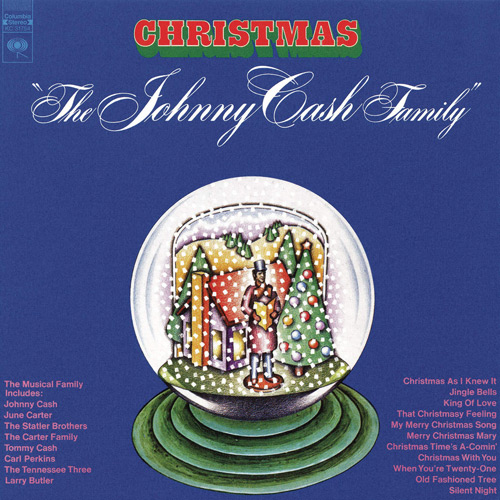 Such
was not always the case. Before the dawn of the counterculture, recording a Christmas
album was a mark of success, a signpost on the road to widespread acceptance, riches,
and immortality. That was just part of the deal entertainers struck with the music
industry. As such, these yuletide LP's generally marked a weakening of resolve,
a dilution of artistic vision. Singers as formidable as Jackie
Wilson, Frank Sinatra, the Everly
Brothers, and the Louvin Brothers folded like hotel stationery when faced with
recording their respective Christmas records.
Such
was not always the case. Before the dawn of the counterculture, recording a Christmas
album was a mark of success, a signpost on the road to widespread acceptance, riches,
and immortality. That was just part of the deal entertainers struck with the music
industry. As such, these yuletide LP's generally marked a weakening of resolve,
a dilution of artistic vision. Singers as formidable as Jackie
Wilson, Frank Sinatra, the Everly
Brothers, and the Louvin Brothers folded like hotel stationery when faced with
recording their respective Christmas records.
You can count on two hands (with fingers left over) the number of great artists that made really great Christmas albums - extended works that reflected the full force of their genius. Phil Spector is the obvious example; his Christmas Gift For You is the best album he ever produced. Then, there's instrumental rockers the Ventures, folk guitarist John Fahey, country thrush Emmylou Harris, rock icon Elvis Presley, and a few others. But, even on their fine Christmas records, these artists softened their touch demonstrably. Perhaps that's just the nature of the beast - with the season comes the sentiment.
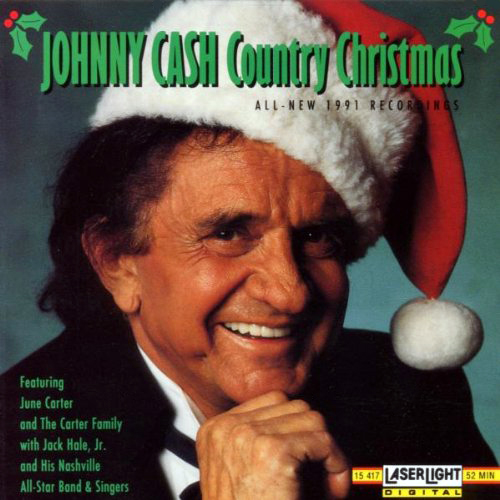 From an artist's perspective, Christmas
can be intimidating. Great art is often built on dissatisfaction, frustration, violence,
carnal desire, and unchecked emotion. How can artists maintain their existential
howl in the face of the baby Jesus? Or more so, in the face of an unforgiving (and
overwhelmingly Christian) record-buying public? And why would they want to? Who
would dare to record a whole album of impiety?
From an artist's perspective, Christmas
can be intimidating. Great art is often built on dissatisfaction, frustration, violence,
carnal desire, and unchecked emotion. How can artists maintain their existential
howl in the face of the baby Jesus? Or more so, in the face of an unforgiving (and
overwhelmingly Christian) record-buying public? And why would they want to? Who
would dare to record a whole album of impiety?
In the end there have been hundreds of fantastic, hard-edged rock, soul, and country Christmas singles by artists as illustrious as Chuck Berry, the Kinks, Otis Redding, Run-DMC, Merle Haggard, and Hank Snow. But, very few Christmas albums have risen to that standard.
Which brings us, finally, to Johnny Cash. His legend is monstrous - the black-clad rockabilly rebel who popped speed like candy, fought his daddy in the mud and the blood and the beer, shot men just to watch them die, and flipped the finger (literally) to the entire Nashville establishment. But, anyone who's listened to his music in any depth (or read autobiographies like Cash, 1997) knows that while John R. Cash was a deeply angry, bitterly conflicted, and inconsolably restless man, he was also a simple country boy longing for respect, peace, and the comfort of home.
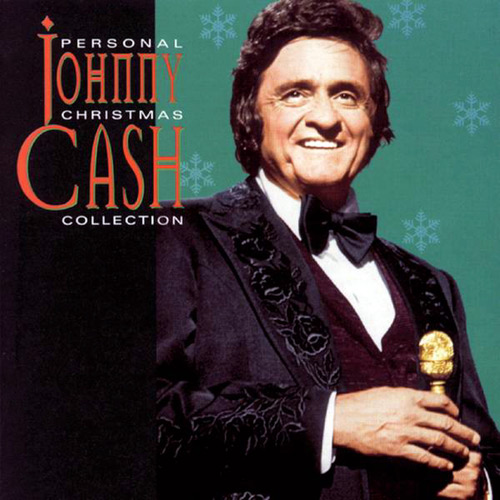 And
that's the Johnny Cash we hear on his Christmas albums. He made four of them, none
of which hold a candle to classics like "Folsom Prison Blues," "Ring
Of Fire," and "Jackson." His very first holiday effort, however, was a single,
the charmingly minimalist "Little Drummer Boy" (1959), recorded for Columbia
Records shortly after he departed from legendary Memphis label Sun. The record
prominently features Indian tom-tom, presaging Cash's fascination with all things
native American - which ultimately begat his 1964 album, Bitter
Tears. "Little Drummer Boy" actually brushed the charts in 1959 (#63
pop) and again in 1960 (#24 country), and it later showed up on The
Christmas Spirit (1963), Johnny's first full-length holiday LP. In some ways, The
Christmas Spirit is fine - a humble little record imbued with Cash's homespun
populism - and it boasts a high quotient of original material. Two charming recitations set the tone: the nostalgic "Christmas As I Knew It," written by June Carter Cash and Jan Howard, and
Johnny's solemn, self-penned title track.
And
that's the Johnny Cash we hear on his Christmas albums. He made four of them, none
of which hold a candle to classics like "Folsom Prison Blues," "Ring
Of Fire," and "Jackson." His very first holiday effort, however, was a single,
the charmingly minimalist "Little Drummer Boy" (1959), recorded for Columbia
Records shortly after he departed from legendary Memphis label Sun. The record
prominently features Indian tom-tom, presaging Cash's fascination with all things
native American - which ultimately begat his 1964 album, Bitter
Tears. "Little Drummer Boy" actually brushed the charts in 1959 (#63
pop) and again in 1960 (#24 country), and it later showed up on The
Christmas Spirit (1963), Johnny's first full-length holiday LP. In some ways, The
Christmas Spirit is fine - a humble little record imbued with Cash's homespun
populism - and it boasts a high quotient of original material. Two charming recitations set the tone: the nostalgic "Christmas As I Knew It," written by June Carter Cash and Jan Howard, and
Johnny's solemn, self-penned title track.
The originality of The Christmas Spirit is its most striking quality. On the whole, it sounds like nothing else in the history of country Christmas music. But mostly, it's just dull. Cash overcompensates for his infamous image, squeezing the life out of the music in an effort to set a properly reverential tone. Christmas kicks the life right out of Cash's usually irrepressible muse, leaving us with a set of tunes far beneath his usual, firebrand standard.
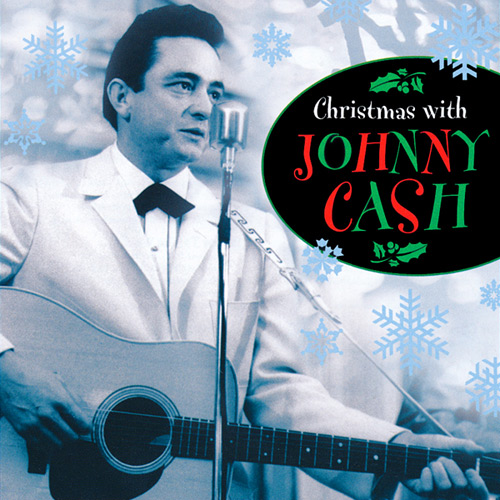 That makes his next seasonal effort, Christmas
With The Johnny Cash Family (1972), also known as Family
Christmas, better in certain ways. It is looser, lighter, and more convivial -
and palpably familial. It was produced deliberately to sound like a family sing-along and was, quite literally, a family affair. Johnny is joined by his wife June, mother-in-law Maybelle, and brother Tommy, as well as longtime associates Carl Perkins and the Statler Brothers. On that level, it succeeds, conveying a warm, traditional, wholly unpretentious portrait of Christmas with the Cash family. But, while songs
like "Christmas With You" (a duet with June) and "That Christmasy Feeling" (sung with Tommy) are pleasant enough, but any hint
of tension is long gone. That tension - embodied as fear, lust, or despair - powers
Johnny Cash's greatest records, and it is sorely missed.
That makes his next seasonal effort, Christmas
With The Johnny Cash Family (1972), also known as Family
Christmas, better in certain ways. It is looser, lighter, and more convivial -
and palpably familial. It was produced deliberately to sound like a family sing-along and was, quite literally, a family affair. Johnny is joined by his wife June, mother-in-law Maybelle, and brother Tommy, as well as longtime associates Carl Perkins and the Statler Brothers. On that level, it succeeds, conveying a warm, traditional, wholly unpretentious portrait of Christmas with the Cash family. But, while songs
like "Christmas With You" (a duet with June) and "That Christmasy Feeling" (sung with Tommy) are pleasant enough, but any hint
of tension is long gone. That tension - embodied as fear, lust, or despair - powers
Johnny Cash's greatest records, and it is sorely missed.
Even compared to such lackluster fare, Cash's third holiday album, Classic Christmas (1980), is awful. The term "classic" is used literally, meaning heavily orchestrated arrangements awash in choral niceties, unidentifiable as country music. While Christmas Spirit and Family Christmas were low-key records, they retained a healthy measure of originality and country flavor. In contrast, Classic Christmas is comprised almost completely of traditional songs like "O Come All Ye Faithful," and it sounds more appropriate for Radio City Music Hall than the Grand Ole Opry. "The Christmas Guest," originally recorded by Grandpa Jones in 1969, provides the only relief from this stifling program of carols. In the end, Classic Christmas is regrettable, forgettable, and occasionally ridiculous (cf. "The Little Gray Donkey").
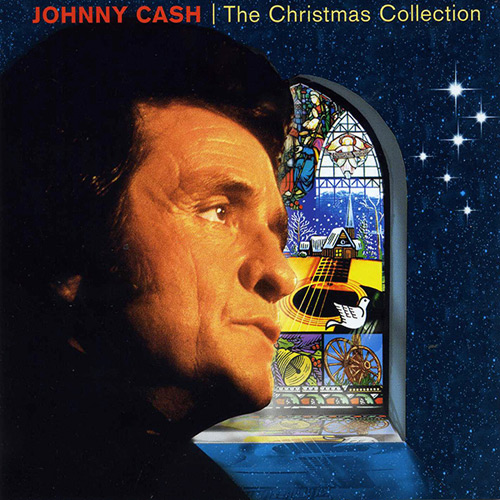 In 1986, Johnny Cash - now roundly out-of-fashion - was booted by Columbia, his
label for nearly 30 years. Eventually, he hooked up with alternative rock producer
Rick Rubin, and in the 1990's they recorded Cash's landmark American
Recordings series of albums that refurbished and transformed his legacy. The
intervening years, however, were bumpy, but they produced yet another Christmas album, Country
Christmas (1991, reissued in a limited
edition in 2006). Featuring June Carter and the Carter Family, Country
Christmas is otherwise unremarkable, recommended only for true devotees of "The
Man In Black."
In 1986, Johnny Cash - now roundly out-of-fashion - was booted by Columbia, his
label for nearly 30 years. Eventually, he hooked up with alternative rock producer
Rick Rubin, and in the 1990's they recorded Cash's landmark American
Recordings series of albums that refurbished and transformed his legacy. The
intervening years, however, were bumpy, but they produced yet another Christmas album, Country
Christmas (1991, reissued in a limited
edition in 2006). Featuring June Carter and the Carter Family, Country
Christmas is otherwise unremarkable, recommended only for true devotees of "The
Man In Black."
Much the same, in fact, can be said for Johnny Cash's entire Christmas catalog. It is more valuable as history - for what it tells us about the man - than as music to enjoy. Christmas Spirit and Family Christmas, at least, bring a measure of Cash's brusque egalitarianism and country charm to the table. But mainly, these relatively mediocre records speak volumes about Cash's values (God, family), needs (acceptance, approval), and fears (condemnation, isolation). In saying these things, Johnny Cash's Christmas records reveal him as one of us - a legend incarnate - but that doesn't make them fun to listen to.
Sadly, even as historical artifacts, Cash's Columbia Christmas recording have been sorely abused. Each of them have been reissued on compact disc - some in multiple versions - although shabbily packaged and budget-priced, though Christmas Spirit and Family Christmas have been reissued relatively intact for download and streaming. The second and third are also sold in tandem as Ultimate Christmas Collection (2005) by Madacy Records.
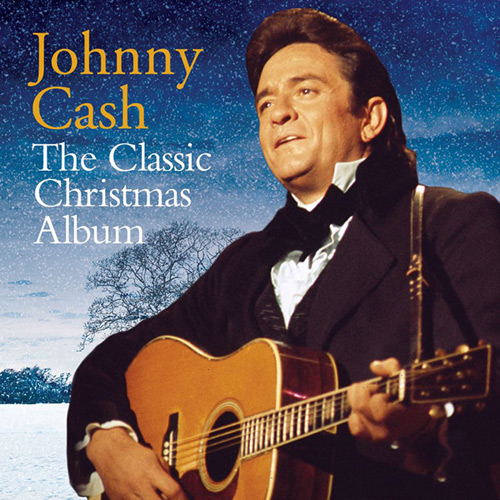 If you love The Man In Black (which I do), but buying cheaply produced reissues of three less-than-great records sounds less-than appealing, there are some good collections on the market. The first was Personal
Christmas Collection (1994), culled from the three Columbia albums, and it
provides some much needed perspective. But, it runs a miniscule 12 tracks - five
of which are drawn from the snoozer Classic
Christmas - and Al Quaglieri's liner notes are wholly unrevealing. The second, Christmas
With Johnny Cash (2003, repackaged 2004),
is little more than an updated version of the same - still just 12 tracks, marginally
improved packaging, and an unreleased
1970 version
of "Christmas As I Knew It" replacing the 1963 original.
If you love The Man In Black (which I do), but buying cheaply produced reissues of three less-than-great records sounds less-than appealing, there are some good collections on the market. The first was Personal
Christmas Collection (1994), culled from the three Columbia albums, and it
provides some much needed perspective. But, it runs a miniscule 12 tracks - five
of which are drawn from the snoozer Classic
Christmas - and Al Quaglieri's liner notes are wholly unrevealing. The second, Christmas
With Johnny Cash (2003, repackaged 2004),
is little more than an updated version of the same - still just 12 tracks, marginally
improved packaging, and an unreleased
1970 version
of "Christmas As I Knew It" replacing the 1963 original.
If you can find it, an inexpensive Sony import called The Christmas Collection (2003) is an interesting alternative. On the plus side, its 20 tracks include nearly all of Christmas Spirit plus a rarely collected version of "Peace In The Valley" (from Ring of Fire: The Best of Johnny Cash, 1963). On the minus tip, it collects a paltry one track from the quaint Family Christmas ("That Christmasy Feeling") while weighting itself down with five from the ponderous Classic Christmas.
A decade later, Sony's Classic Christmas Album (2013) largely rectified the situation. While it stretches only to a middlin' 16 tracks, those tracks were wisely selected. Classic Christmas includes every song I've deemed "essential" (see below), which makes it the best CD on the market. With the demise of recorded media all but certain, it's likely to be the best one ever released. [top of page]
Selected Albums
- The Christmas Spirit (1963)
- Christmas With The Johnny Cash Family (1972)
- Classic Christmas (1980)
- Country Christmas (1991)
- Personal Christmas Collection (1959-1980; 1994)
- The Christmas Collection (1959-1980; 2003)
- Christmas With Johnny Cash (1959-1980; 2003)
- Christmas With Johnny Cash (repackaged, 2004)
- Ultimate Christmas Collection (1972-1980; 2005)
- Country Christmas (limited edition, 2006)
- The Classic Christmas Album (1959-1980; 2013)
- The Christmas Spirit (download, 2014)
- Christmas With The Johnny Cash Family (download, 2014)
- Classic Christmas (download, 2014)
- Christmas: There'll Be Peace in the Valley (2016)
Essential Songs
- Christmas As I Knew It (1963)
- The Christmas Guest (1980)
- The Christmas Spirit (1963)
- Christmas With You (with June Carter Cash, 1972)
- The Gifts They Gave (1963)
- I Heard The Bells On Christmas Day (1963)
- Little Drummer Boy (1959)
- Merry Christmas Mary (1972)
- Ringing The Bells For Jim (1963)
- That Christmasy Feeling (1972)
Further Listening
- Christmas Time In The Valley (Freddy Fender, 1977)
- Christmas With The Louvin Brothers (Louvin Brothers, 1961)
- Hillbilly Holiday (various artists, 1988)



